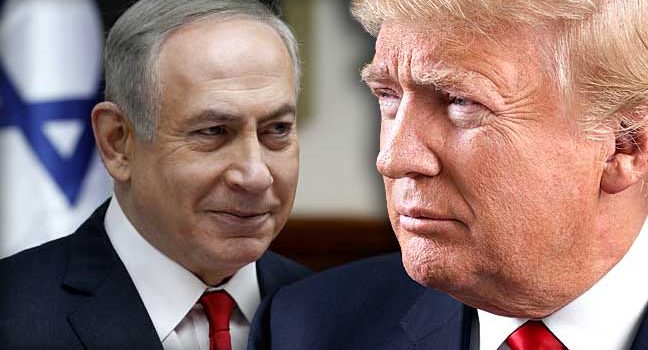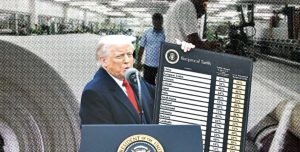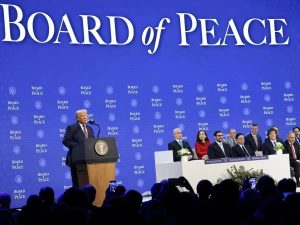WASHINGTON – President Donald Trump has said the United States would no longer insist on a two-state solution to the Israeli-Palestinian conflict, backing away from a policy that has underpinned US role in Middle East peacemaking since the Clinton administration.
At a news conference with Israeli PM Benjamin Netanyahu on Wednesday, Trump promised to deliver a “great” peace deal, but said both sides must compromise.
The new president warmly welcomed Israel’s Prime Minister Benjamin Netanyahu to the White House and hailed the “unbreakable” bond between their countries, the BBC reported.

In the conference, Trump also asked his visitor to “hold off” on settlement building for “a little bit”.
“So I’m looking at two state and one state, and I like the one that both parties like. I’m very happy with the one that both parties like. I can live with either one,” he said.
“I thought for a while the two-state looked like it may be the easier of the two but, honestly, if Israel and the Palestinians are happy, I am happy with the one they like the best,” he added.
The Israelis and Palestinians have had no substantive peace talks since 2014. Israel has approved thousands of new homes in West Bank and East Jerusalem settlements since Trump took office last month.

The Israeli government is hoping for better relations with the White House after eight years of friction with the former Obama administration.
Just five days before Trump’s January 20 inauguration, Barack Obama’s outgoing US administration was among 70 countries to endorse this vision at a peace conference in Paris.
And just a month before that, Obama’s ambassador to the United Nations broke with longstanding US policy to allow a UN motion that criticized Israeli settlement building.
Addressing a US-Israeli conference in December, the then secretary of state John Kerry called settlements a “barrier” to progress.
Under Trump, that vision appears dead, and Washington has aligned itself with Netanyahu’s government and its supporters in the right-wing settler movement.
At Wednesday’s press conference, neither leader committed explicitly to back a future independent Palestine, a longstanding bedrock of US policy.
“I think the Palestinians have to get rid of some of that hate that they’re taught from a very young age,” he said, echoing Netanyahu’s argument that Palestinians are not ready for peace.
“They’re taught tremendous hate. I have seen what they’re taught… it starts in the school room, and they have to acknowledge Israel.”
Netanyahu, who had warm words for the US alliance, said: “First, the Palestinians must recognize the Jewish state. They have to stop calling for Israel’s destruction.”
“Second, in any peace agreement, Israel must retain the overriding security control over the entire area west of the Jordan River,” he added.
International rebuke
The change in the US stance has triggered Palestinian despair and consternation in international capitals.
The second ranking official in the Palestine Liberation Organisation, Saeb Erekat, denounced it as an attempt to “bury the two-state solution and eliminate the state of Palestine.” And he warned that any single state that emerged would lose Israel’s Jewish character.
“There’s only one alternative,” he told a news conference. “A single democratic state that guarantees the rights of all: Jews, Muslims and Christians.”
Speaking in Cairo after talks with Egypt’s President Abdel Fattah al-Sisi, UN chief Antonio Guterres warned that “everything must be done” to preserve the two-state solution.
France, which organized the January peace conference, was also unimpressed. Its ambassador to the UN, Francois Delattre told reporters “our commitment to the two-state solution is stronger than ever.”

Two-state solution
A “two-state solution” to the decades-old conflict between Israelis and Palestinians is the declared goal of their leaders and the international community.
It is the shorthand for a final settlement that would see the creation of an independent state of Palestine within pre-1967 ceasefire lines in the West Bank, Gaza Strip and East Jerusalem, living peacefully alongside Israel.
The UN, the Arab League, the European Union, Russia and, until now, the US routinely restate their commitment to the concept.
More than 600,000 Jews live in about 140 settlements built since Israel’s 1967 occupation of the West Bank and East Jerusalem – land Palestinians claim for a future state.
The settlements are considered illegal under international law, though Israel disputes this.














